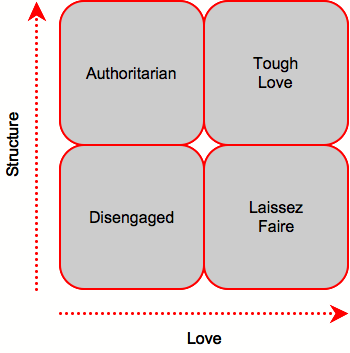Please press (at least!) one of these.
It costs you nothing, and (possibly) helps us spread the word!
Tough Love
Monday, 9 November 2009
With a new baby on the way (8 weeks and counting), I was interested from a personal point of view in last week’s Demos report into parenting, which looked across a couple of simple dimensions of approach and concluded that children brought up in a “tough love” environment were the ones most likely to succeed. Professionally, I’m intrigued by the link between this and management styles, particularly following the NICE report from earlier in the week regarding management and stress.
For those who haven’t seen the Demos report, my interpretation of the model they used is as follows:
I’ve used a lot of shorthand here, but in simple terms, the four categories they identify are:
Tough Love
This is their “gold standard” - the perfect balance between consistent, structured discipline and support, empathy, encouragement and love.
Laissez Faire
The support, empathy, encouragement and love elements, without the consistent application of rules, structure and discipline.
Authoritarian
The consistent application of rules, structure and discipline, without the warmth, support, encouragement and love.
Disengaged
Parenting without either the consistent application of rules, structure and discipline, or warmth, support, encouragement and love.
--
The link between this and management skills and style is obvious, as is the tie in with the NICE report from last week on stress in the workplace (see here) and the links to bad management.
As with most things in life (certainly from my point of view), it’s all a question of balance. The manager who is a “friend” to his or her staff without taking the real responsibility of management seriously is the laissez faire parent. The manager who picks up on everything that goes wrong, but fails to offer support and encouragement or be appropriately flexible is the authoritarian. And the manager who is largely absent (perhaps playing internal politics, or simply being rather lazy) falls neatly into the disengaged category.
However, these four categories are clearly caricatures. There are likely to be times when each of us dips into various different parts of the model, either at different times, depending on our own circumstances, or indeed depending on who we are dealing with. But the aim, surely, should be to maximise the time we spend in the top right quadrant of “tough love” in our management approach.
I’m looking forward to building aspects of this report and the simple model I’ve developed above, and I’d love your help with examples (anonymity respected!). If you have experience or examples of management that falls into any of the above categories, please pop them into the form below, or e-mail to blogidea@trainingreality.co.uk. Many thanks!
Please press (at least!) one of these.
It costs you nothing, and (possibly) helps us spread the word!




